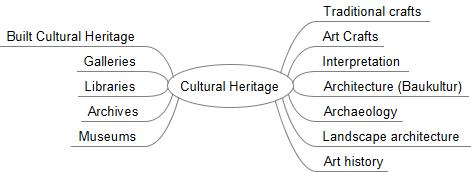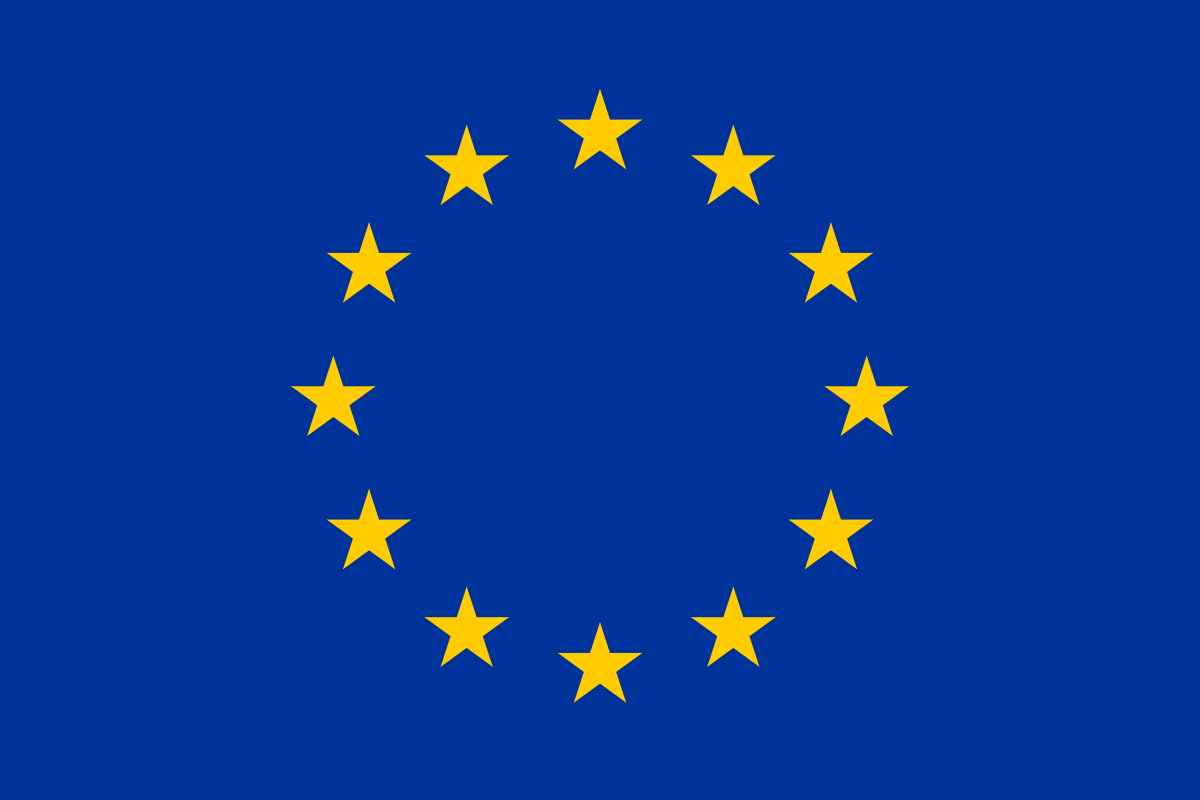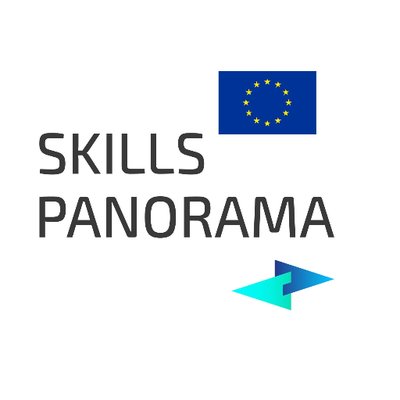


Deliverable 1p.1 Workshop series 1.1 “Gap analysis heritage related skills, competences, qualifications and occupations”
Deliverable 1p.2 Workshop series 1.2 “Digital competences for the Cultural Heritage Sector”
Deliverable 1p.3 Study visit to CEDEFOP
Deliverable 1p.4 Networking meeting at ESCO
Deliverable 1i.1 Thematic conference “Heritage related skills in Europe”
Deliverable 1i.2 Thematic conference “Digital skills for the European Cultural Heritage Sector”
Deliverable 1i.3 Strategy paper for Skills classification system support actions
Deliverable 1i.4 Implementation plan for Skills classification system support actions
Deliverable 1i.5 Report “Profile of Heritage Professions and CCIs in ESCO”
Deliverable 2p.1 Workshop series 2.1 “Recommendations of the OMC report on heritage skills
Deliverable 2p.2 Workshop series 2.2 “Needs analysis Certification Process for heritage skills
Deliverable 2p.3 Workshop series 2.3 “Requirements for a network of experts, volunteers and apprentices for the Cultural Heritage Sector”
Deliverable 2p.4 Concept paper for a network of experts, volunteer and apprentices
Deliverable 2p.5 Study-visits to OMC Best Practices
Deliverable 2p.6 List of Community of Practice (Best practice approaches) for handicrafts (including videos already produced in PRO-Heritage)
Deliverable 2i.1 Thematic conference “Networking of Experts, Volunteers and Apprentices in the Cultural Heritage Sector”
Deliverable 2i.2 Networking platform for experts, volunteers and apprentices
Deliverable 2i.3 Networking meetings (in partner country)
Deliverable 2i.4 Report “Establish a Network of Experts and a Community of Practice”
Deliverable 3p.1 Workshop series 3.1 “CCI sector structure for EU Skills Panorama”
Deliverable 3p.2 Workshop series 3.2 “Regional Heritage skills gap”
Deliverable 3i.1 Thematic conference “CCI Sector Structure for EU Skills Panorama” (followed by a “European Day of Regions” event)
Deliverable 3i.2 Networking meetings (in partner countries)
Deliverable 3i.3 Report “CCIs in EU Skills Panorama” (Skills gap, proposed CCI sector structure and action plan for implementation)
Deliverable 4p.1 Workshop series 4.1 “Educational system and Cultural (Heritage) Skills”
Deliverable 4p.2 Workshop series 4.2 “Definition Heritage skills at risk”
Deliverable 4p.3 Workshop series 4.3 “Best practice models for training cultural (heritage) skills”
Deliverable 4p.4 Workshop series 4.4 “Skills enhancement for Cultural Heritage Sector – Needs analysis and suggestions”
Deliverable 4p.5 Country reports “Education system and Cultural (Heritage) Skills” (adapting existing Country reports from MODI-FY and PRO-Heritage)
Deliverable 4p.6 Study-visits to Best Practice Models for Skills enhancement in Europe (e.g. Austrian Dual Education)
Deliverable 5p.1 Workshop series 5.1 “Quality Standards for Cultural Heritage in Europe” (incl. for EU funded interventions)
Deliverable 5p.2 Workshop series 5.2 “Quality Seal for digital knowledge transfer on cultural heritage”
Deliverable 5p.3 Networking meeting in Cooperation with ECQA at EuroSPI² conference
Deliverable 5p.4 Study-visits to a MODI-FY Partner Organisation with certified staff members
Deliverable 5i.1 Thematic conference “Quality Standards for Cultural Heritage in Europe – Current Situation and Future Needs”
Deliverable 5i.2 Report “Quality standards for EU-funded interventions”
Deliverable 5i.3 Report “Gaps, Barriers and Roadblocks in Applying Standards in the Heritage Sector”
Deliverable 5i.4 Set of Standards for Heritage Sector (available standards in countries) -à available in EN
Deliverable 5i.5 Report “Generating and Successful Implementing a Quality Seal for Digital Knowledge Transfer on Cultural Heritage”
Deliverable 5i.6 Report “Certification and Qualification for the Cultural Heritage Sector”
Deliverable 6p.1 Workshop series 6.1 “Innovative CCI projects for Cultural Heritage”
Deliverable 6p.2 Workshop series 6.2 “Heritage skill gaps to be closed”
Deliverable 6p.3 Curriculum for specific heritage skills
Deliverable 6p.4 Training materials for specific heritage skills
Deliverable 6p.5 Curriculum school pupils, teachers and other persons of the education systems
Deliverable 6p.6 Training materials school pupils, teachers and other persons of the education systems
Deliverable 6p.7 Study-visits to Best Practice Examples for innovative CCI projects for Cultural heritage
Deliverable 6p.1 Thematic conference “CCI projects innovating the Cultural Heritage Sector”
Deliverable 6p.2 Thematic conference “Skills Development, Activities and Dissemination for the Cultural Heritage Sector”
Deliverable 6p.3 National networking meetings with representatives of National Education System, Employment Agencies and Cultural Heritage Sector (in cooperation with UNESCO)
Deliverable 6p.4 Blended training curriculum for specific heritage skills (skill gaps as in e.g. digitisation and audience development)
Deliverable 6p.5 Blended training material for specific heritage skills (skill gaps as in e.g. digitisation and audience development)
Deliverable 6p.6 Guidelines for skills development, activities and dissemination
Deliverable 6p.7 Serious online game for Cultural Heritage
Deliverable 6p.8 Report “Innovation in the Cultural Heritage Sector”
Deliverable 7p.1 Workshop 7.1 “Life-Cycle definition for Cultural Heritage and Heritage Profession” (consortium)
Deliverable 7p.2 Workshop series 7.2 “Best Practices Examples for Innovation in the Cultural Heritage Sector”
Deliverable 7p.3 Workshops with (re-)activated craftsmen in Cultural Heritage Sector
Deliverable 7p.4 Study-visits “Heritage professions in participating regions”
Deliverable 7i.1 Networking meetings in cooperation with expert in marketing, ecology, sustainability and terminology resp. employment agencies and Cultural Heritage Sector
Deliverable 7i.2 Thematic conference “Life-cycle of Cultural Heritage and Heritage Professions” (consortium)
Deliverable 7i.3 Thematic conference “Innovation in Cultural Heritage Sector” (consortium)
Deliverable 7i.4 Report “Life-Cycle of Heritage Professions”
Deliverable 8p.1 Workshop series 8.1 “CCI Actors and Spaces for Innovation for Heritage”
Deliverable 8p.2 Workshop 8.2 “Conceptualise EU Competence Centres for Heritage Asset” (consortium)
Deliverable 8p.3 National networking meetings with Creative Hubs, CCI actors and experts of the Cultural Heritage Sector
Deliverable 8p.4 Study-visits to Best practice examples “CCI Actors and Spaces for Innovation for Heritage” (consortium)
Deliverable 8p.5 Concept reports (with case studies) on innovation in heritage for the stakeholders’ meeting
Deliverable 8i.1 Thematic conference “How can CCI actors and spaces innovate the Cultural Heritage Sector?”
Deliverable 8i.2 Stakeholders’ meeting on Innovation for heritage
Deliverable 8i.3 Report “CCI Actors and Spaces for Innovation for Heritage”
Deliverable 8i.4 Report “Innovation for Heritage – Strategy and Implementation Plan”
Deliverable 8i.5 Evaluation Report “Piloting EU Competence Centre for Heritage Assets”
Deliverable 9p.1 Report “Peer-to-peer mobility in INCREAS”
Deliverable 9p.2 Report “Study-visits in INCREAS”
Deliverable 9i.1 Peer-to-peer mobility for Cultural Heritage experts, volunteers and/or apprentices, including entry in European Skills Passport
Deliverable 9i.2 Report “Impact of Peer-to-Peer Mobility and Study Visits on the Cultural Heritage Sector”
Deliverable 10p.1 1. Dissemination & communication plan (M1-M10)
Deliverable 10p.2 2. Dissemination & communication plan (M11-M20)
Deliverable 10p.3 3. Dissemination & communication plan (M20-M28)
Deliverable 10i.1 Annual dissemination & communication activities report period 1-10
Deliverable 10i.2 Annual dissemination & communication activities report period 11-20
Deliverable 10i.3 Annual dissemination & communication activities report period 21-28
Deliverable 10i.4 INCREAS project website & short version at partner websites
Deliverable 10i.5 Business plan EU Competence Centres for Cultural Heritage


ISCO groups
↓
Occupations
↓
Skills
INCREAS has the task to describe the occupation and the related skills in the Cultural Heritage Sector. Our approach is to start with the business/ sector needs, which means we are going to ask the stakeholders representing the sector what occupations and skills are existing, needed or already lost. For this purpose, we created a survey and will organise several workshops to gather this information.
As next step, these results will be compared and analysed with the existing structure on ESCO and then discussed with the ESCO secretary to define options, procedures, and actions to include the missing elements in ESCO.
For a proper result we will coordinate these results not only with the EU commission, but also with FLIP 1 and 3 resp. with CHARTER. This will then be a comprehensive Cultural Heritage Sector on the ESCO portal, which will be later extended by CHARTER.
For the future success of the portal, it seems to be important to take a closer look on the NACE structure and the CPA codes. Both elements are relevant to allocate organisations resp. products or services to the Cultural Heritage Sector which will ensure that the relevant statistical data will be available and in a proper structure for describing the Cultural Heritage Sector.

The Cedefop states related to their Skills Panorama:
“Sector is defined as a group of companies that have the same economic activity. Information provided on sectors within the Skills Panorama is structured on the basis of NACE rev. 2 classification. The information can be accessed on a broad sector level (such as Business services), or a more detailed sector level, where available in the classification (such as Financial and Insurance Activities).”
To show the Cultural Heritage Sector on that Panorama will be a challenge related to this statement because in the NACE structure there is no element called Cultural Heritage.
The Panorama shows information about employment structure and recent and expected future trends related to jobs and skills within the sector. This step will also have to consider that business and employment structure in the sector is only defined by employment due to a high number of one-person companies and partly precarious employment (more in the cultural part of the Sector, not in the Cultural Heritage Sector).

The sister project of INCREAS is focussed on the use of the finance and patent system in the CCI Sector and will ensure greater integration of the cultural and creative sectors into the European competence and qualifications framework.
CHARTER: will come soon
The new sister project – starting in June 2021 – will have the main objective to organise activities in the areas of Financing, Learning, Innovation and Intellectual Property Rights for cultural and creative sectors. Additionally, the objective of the action is to work in a cross-sectoral manner between the different project components.

This portal was developed by the pilot project FLIP 1 as a reaction to the Covid-19 pandemic. It has one central purpose:

INCREAS is a Pilot policy project co-funded by the European Union.
The European Commission support for this project does not constitute an endorsement of the contents of this website which reflects the views only of the authors. The Commission cannot be held responsible for any use which may be made of the information contained therein.
©2021 – INCREAS